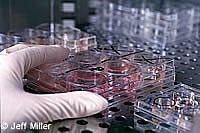European life science group calls for continued support of stem cell research
The European high level group on life sciences (LSHLG) has issued a statement calling for continued support for carefully regulated research on human stem cells. The group, established in April 2000 by Research Commissioner Philippe Busquin to provide expert advice on life sciences and technologies, issued the statement on 19 December at a conference entitled 'Stem cells: therapies for the future?' The LSHLG said that 'current research on stem cells, either from differentiated tissue or from embryos, is scientifically sound and medically promising and should be actively developed and supported.' The group added that 'although the use of human stem cells in regenerative medicine is still at an early stage of development, it has the potential to deliver real progress in the treatment of various severe diseases.' It said human stem cell research could revolutionise therapy on the same scale as the introduction of antibiotics. The group agreed that: - reproductive cloning should be prohibited; - the derivation of human embryonic stem cells from therapeutic cloning (ie - nuclear transplants) 'has not been achieved and appears to raise considerable difficulties.' The group calls for further research into strategies to help overcome immune rejection; - the group agreed on the use of spare human embryos for the preparation of embryonic stem cell lines, although it emphasises its respect for 'the special moral status of the human embryo even prior to implantation.' Research on human embryonic stem cells, the group said, should be 'carefully regulated, peer reviewed, scientifically sound, directed towards substantial goals and ethically controlled.' - both publicly and privately-funded research should be subject to the same regulations; - a European registry of human embryonic stem cell lines should be established.



